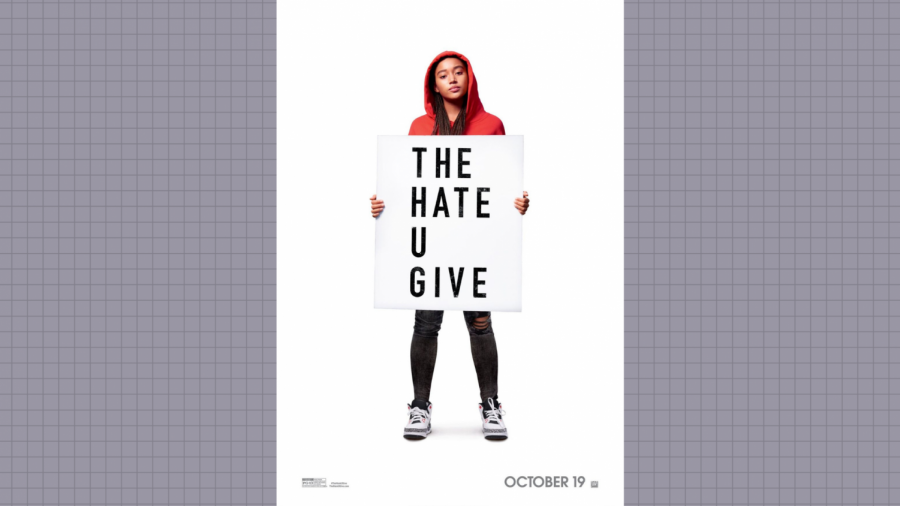REVIEW: “The Hate U Give”
T.H.U.G. L.I.F.E. “The Hate U Give Little Infants F*cks Everyone.” This acronym created by the late hip-hop icon, Tupac Shakur is a thought-provoking political statement that remains just as accurate today as it was almost 30 years ago. Tupac believed that hate was the fire fueling the dysfunction in the world. We are not born with vendettas or angst against one another. Prejudice and animosity are learned attributes that we pass on to the children that look up to us. These hateful attitudes create an endless cycle of intolerance, injustice and insufficiency.
Angie Thomas’s bestselling novel, “The Hate U Give,” tells the story of Starr Carter (Amandla Stenberg), a teenage girl who finds herself caught between two worlds. Forced to attend a private school miles away from her crime-ridden neighborhood, Starr is tasked with the daily battle of dodging microaggressions and stereotypes. While it is okay for her white peers to sing rap songs and make hip-hop references through their vernacular and choice of clothing, Starr avoids all of these things in fear of being seen as “ghetto.” Starr’s two worlds begin to collide after she sees her childhood friend, Khalil Harris, get shot during a routine traffic stop. With support from her friends, family and community, Starr shines her light by standing up against racial injustices and police brutality.
On Oct. 19, Thomas’s words came to life on screen and have since taken the nation by an emotional storm. The book is 464 pages long and despite its length, it’s an easy read. You become attached to the characters and regardless of its tragic beginning, Thomas keeps you hanging on to every word. Directed by the culturally acclaimed, George Tillman, Jr. (“Soul Food,” “Barber Shop,” “Roll Bounce,” “Notorious”) his cinematic vision ties in very well with the world created by Thomas.
Amandla Stenberg does an exceptional job portraying Starr. Stenberg’s parents are played by Regina Hall (“Scary Movie,” “Girls Trip,” “Malibu’s Most Wanted”) and Russell Hornsby (“Grimm,” “Fences,” “Seven Seconds”). Khalil is played by Algee Smith who is known mostly for his role as Ralph Tresvant in “The New Edition Story.” The chemistry between the cast creates a believable family atmosphere.
For the most part, the movie stays true to the book. There is one main difference between the two and this ending scene was enlightening when reminding the audience of the title’s relevance.
SPOILER ALERT: In a standoff between a local drug lord and Starr’s father, Starr’s elementary-aged brother pulls a gun on the drug lord while screaming “Don’t shoot my dad!” The movie slows and there is a progressive zoom on each of the characters faces as Starr analyzes the situation. She gives a brief monologue about how hate, fear and uncertainty have influenced her brother to hold a man at gunpoint.
This scene was incredibly powerful, a real tear-jerker. Seeing the police officers rush to the scene while pointing a gun at young Sekani increased the heavy impact of Starr’s words: “When are you going to realize that this is not the answer?” Was Starr talking to the white officers? Was she talking to the drug lord? Or was she talking to the audience? Either way, she got her point across.
Following the movie, I spoke with a college-aged girl that sat near me in the theater and asked her what she thought about “The Hate U Give.”
“Growing up my parents never had conversations with me and my sister about what to do if we were pulled over by the police and it’s because we’re white,” she said. “I think that this movie does a really good job of allowing people to see that even though it’s 2018, it is still dangerous to be a black person in America. People still see civil rights as an option and that’s not right.”
So far this year there have been 852 people killed in incidents relating to police brutality. Last year, there were a total of 14 out of 365 days where police killings did not take place. Black men are three times more likely to be harassed by police officers than white men. In a nation that has built its foundation on equality, I’m sure you can find the irony in this statistic.
I was 14 years old when I got the talk. It was my first time behind the wheel and after I drove around the block a couple of times, my stepdad turned to me and said, “Do you know what to do if you were to be stopped by a police officer?”
My brother got the talk when he was 12. Starr Carter was 9. Books and movies have a special way of refining our thought process. Through made up characters in a number of situations, we are able to see the world from the viewpoint of someone who may not look, sound or act anything like us.
In summation, “The Hate U Give” was a great book and an even better movie. From the perspective of a 16-year-old girl battling an identity crisis, we learn that the world exists of both the negative and positive versions of ourselves. In the words of Angie Thomas and Tupac Shakur, “Life is not about the hate that you give, but the hate that we give.”










Aunt Neane • Oct 22, 2018 at 1:46 pm
Because of this well written thorough review, I think I will go see this movie.